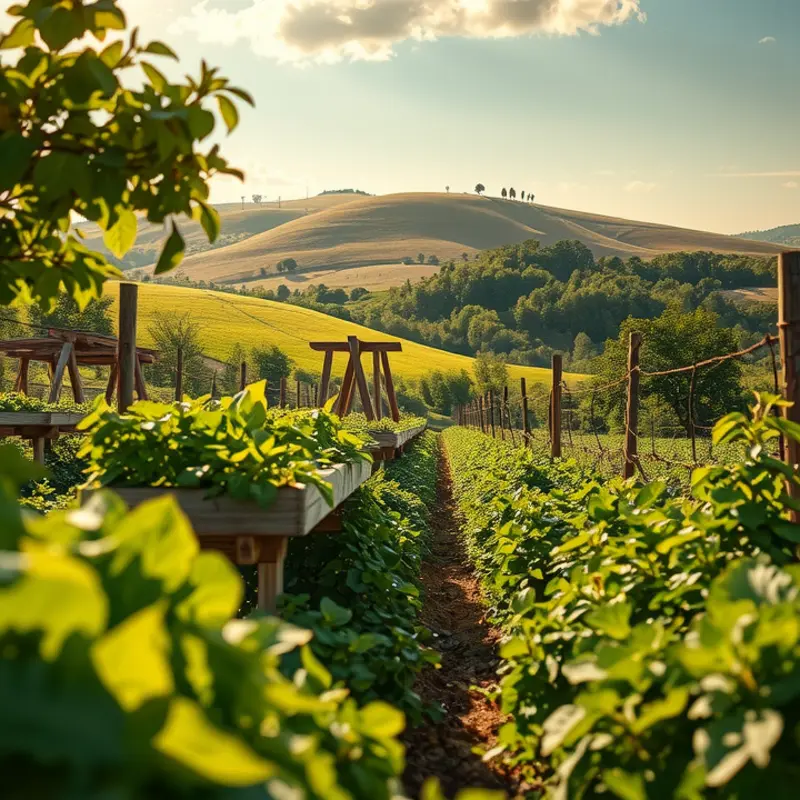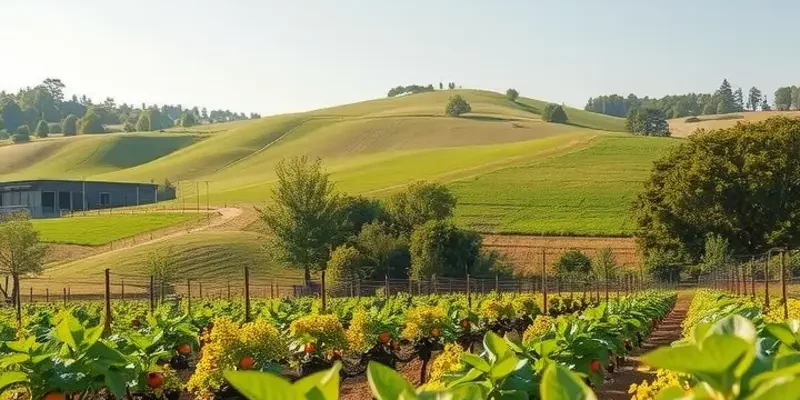Every meal is an opportunity to make a positive impact on the environment, especially our forests. With the rise of eco-conscious consumerism, individuals have the power to influence agricultural practices and protect vital ecosystems. By making informed food choices, not only can we reduce our carbon footprint, but we can also actively support forest preservation, combat deforestation, and sustain biodiversity. Delving into sustainable agriculture and plant-based diets reveals the significant role they play in safeguarding our forests, making each bite matter.
The Forest-Food Connection: Understanding the Impact of Our Choices

Our food choices have far-reaching consequences. Traditional farming, with its emphasis on large-scale production, often leads to deforestation, threatening forest ecosystems. This destruction is driven by the demand for commodities like palm oil, soy, and beef. As forests are cleared, valuable habitats are lost, biodiversity declines, and carbon sequestration is reduced, exacerbating climate change.
However, a shift towards sustainable agriculture can mitigate these impacts. Sustainable farming emphasizes diverse, resilient ecosystems that support soil health and biodiversity. Agroforestry, for example, integrates trees with crops or livestock, protecting forests while increasing yields. This practice not only preserves habitats but also sequesters carbon, offering a buffer against climate instability.
Adopting plant-based diets further benefits forest conservation. Producing plant-based foods generally requires fewer resources than animal agriculture. For instance, legumes and grains have a smaller carbon footprint and demand far less land, water, and energy. By reducing meat consumption, we can alleviate pressure on forests, allowing ecosystems to recover and thrive.
Choosing local food also plays a role in forest conservation. Transporting food across the globe involves significant fossil fuel consumption, contributing to greenhouse gas emissions. When individuals support local producers, they help curtail these emissions. Local food systems often involve smaller-scale, diversified operations that align with eco-friendly practices, such as crop rotation and organic fertilizer use. This supports soil health, enhances carbon sequestration, and ultimately aids forest preservation.
Agribusiness practices heavily impact forest health. Large-scale monocultures and excessive chemical use degrade soil and water quality, hampering nearby forest ecosystems. Pesticides and fertilizers can drift or runoff, affecting flora and fauna in adjacent areas. Therefore, choosing food from responsible sources committed to environmental stewardship can make a significant difference.
Environmentally-conscious individuals can take several steps to protect forests. Embrace a plant-based or flexitarian diet to reduce your environmental impact. Opt for locally produced items to minimize transportation emissions. Supporting farms that employ sustainable, regenerative practices is crucial. By reducing food waste and enhancing storage methods, as discussed in this guide, you can further minimize your ecological footprint.
Ultimately, our everyday choices shape the world around us. Being mindful of how our food is produced, processed, and consumed can significantly affect the world’s forests. Through sustainable eating, we contribute to a healthier planet, ensuring that the natural beauty and biodiversity of forests are preserved for generations to come.
Empowering Choices: Strategies for Sustainable Eating

The choices we make at the dining table reflect our values and influence the environment. By adopting sustainable eating practices, we have the power to protect our forests and reduce environmental impact. Each decision contributes to a healthier planet—empowering ourselves with knowledge and strategies to choose wisely is paramount.
Local sourcing is one potent method of sustainable eating. By supporting nearby farmers, we minimize the carbon emissions associated with long-distance transportation. Fresh produce traveling short distances also retains more nutrients, ensuring better quality ingredients. Engaging with local farmers markets fosters community relationships and allows consumers to obtain produce grown with environmentally-friendly methods. Building this connection creates demand for more sustainable practices, encouraging others in the industry to follow suit.
Eating seasonally complements local sourcing by aligning our diets with nature’s cycles. Seasonal food requires fewer resources for production and transport. It’s naturally harvested at peak ripeness, offering enhanced flavor and nutrition. Embracing this practice invites diversity into our diets and shifts our dependence away from resource-heavy agriculture. With fewer inputs required for seasonal food production, forests face less threat from agricultural expansion.
Exploring plant-based diets is another impactful strategy. The global demand for meat significantly drives deforestation for pastureland. By reducing our intake of animal products, we lower the stress on these ecosystems. Incorporating more plant-based meals can begin with simple swaps, like replacing meat with mushrooms or legumes, which can be just as satisfying and nutritious. Despite common myths on plant-based challenges, there are easy solutions to barriers, like exploring easy plant-based eating modifications.
Consider supporting sustainable brands when purchasing food. These companies prioritize ethical sourcing, eco-friendly practices, and fair treatment of workers. Often, they provide certifications, like organic or fair trade, to signal their commitment. By choosing to support these brands, consumers help drive the market toward sustainability and protect natural ecosystems.
Collective individual actions bring significant change. Small steps taken by many culminate in a large shift towards reducing environmental impact. By choosing local and seasonal foods, incorporating plant-based meals, and supporting sustainable brands, individuals contribute to a global movement that alleviates pressure on forests.
Encouraging these practices among friends and family can amplify their impact. Sharing meals, exchanging recipes, and discussing sustainable practices can inspire others and create a ripple effect within communities. Together, these empowered choices can forge a path toward a future where our food systems nourish people and planet alike.
Final words
Making conscious food choices is one of the most powerful actions environmentally-conscious individuals can take to protect our forests. By understanding the connections between food production and deforestation, we can advocate for sustainable practices that nurture both our health and the planet. Whether opting for plant-based meals, supporting local farms, or choosing organic options, each decision plays a pivotal role in preserving biodiversity and mitigating climate change. As guardians of the environment, we hold the power to not only influence our own health but also to ensure the vitality of our forests for generations to come.








